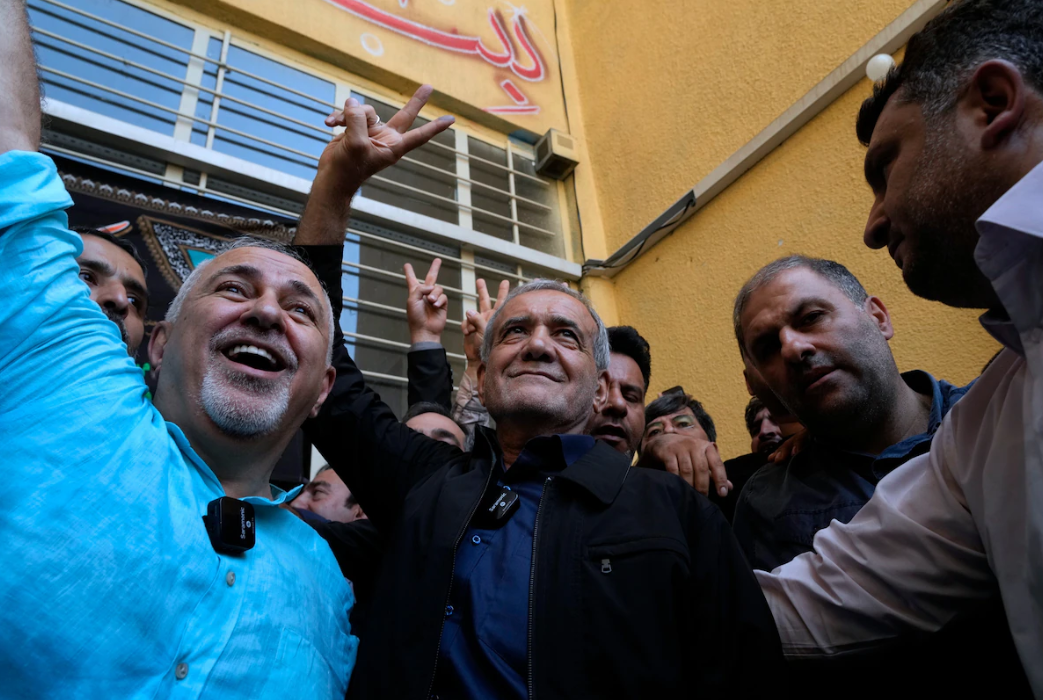(Al Jazeera Media Network) Iran’s president-elect Masoud Pezeshkian has promised to serve all Iranians in his first public address being declared the winner of an election run-off against his hardline rival Saeed Jalili.
Speaking in his first public address on Saturday, Pezeshkian, who is seen as a centrist and reform-minded candidate, said he will “usher in a new chapter.”
“We are ahead of a big trial, a trial of hardships and challenges, simply to provide a prosperous life to our people,” he said during brief remarks at the mausoleum of the late Grand Ayatollah Ruhollah Khomeini.
He further hailed the relatively high turnout in the poll, vowing to listen to the voices of the Iranian people and “fulfill all the promises I had made.”
Pezeshkian secured nearly 16.4 million of the more than 30 million votes cast, ahead of Jalili who received some 13.5 million, according to the official count.
“By gaining majority of the votes cast on Friday, Pezeshkian has become Iran’s next president,” the Interior Ministry said in a statement.
Shortly after the announcement, Jalili conceded defeat, saying anybody elected by the people must be respected.
“Not only should he be respected, but now we must use all our strength and help him move forward with strength,” he told state television.
There were scenes of celebration after the results were declared, with small groups of Pezeshkian supporters taking to the streets.
Russian President Vladimir Putin was among several world leaders to congratulate Pezeshkian, but western leaders were yet to respond.
Participation in the run-off was 49.8 percent in the tight race between Pezeshkian, the sole moderate in the original field of four candidates who has pledged to open Iran to the world, and the former nuclear negotiator Jalili, who is a staunch advocate of deepening Iran’s ties with Russia and China.
The vote on Friday followed a June 28 ballot with a historically low turnout, when more than 60 percent of Iranian voters abstained from the snap election for a successor to Ebrahim Raisi, following his death in a helicopter crash in May.
In last week’s election, Pezeshkian received about 42.5 percent of votes and Jalili some 38.7 percent.
Reporting from Tehran on Saturday, Al Jazeera’s Resul Serdar noted that about 50 percent of Iranians didn’t vote as some didn’t “have faith that the election will bring any change, whether the winner is a conservative or a reformist.”
Others boycotted the election, Serdar said. “This is a silent protest.”
Pezeshkian is expected to assume his duties within 30 days. As he is still a member of parliament from Tabriz, the body will first vote on his resignation.
The country’s ninth elected president will next have to be officially endorsed in a ceremony by the supreme leader, Ayatollah Ali Khamenei, after which he will be sworn in at the parliament.
Political analysts say Pezeshkian’s triumph might see the promotion of a pragmatic foreign policy, ease tensions over the now-stalled negotiations with major world powers to revive a 2015 nuclear deal and improve prospects for social liberalization in Iran.
Both presidential candidates had promised to revive the flagging economy, beset by mismanagement and sanctions reimposed since 2018 after the United States’ then-President Donald Trump unilaterally ditched the nuclear deal.
Internally, Pezeshkian will “face resistance from the political establishment here – the unelected officials and bodies are significantly powerful in Iran and without their approval, it is going to be quite tough for him to implement his promised policies,” Serdar said.
Mostafa Khoshcheshm, a Tehran-based analyst and professor at Fars Media Faculty, said he was not expecting strategic changes to Iran’s foreign policy, which “is decided by the entire establishment, mostly at the Supreme National Security Council, where [there are] representatives of the government as well as the armed forces, the Iranian supreme leader, and the parliament”.
Much would also depend on the outcome of the United States’ presidential election in November.
In the end, Pezeshkian will be in charge of applying state policy outlined by Khamenei, who wields ultimate authority in the country.


